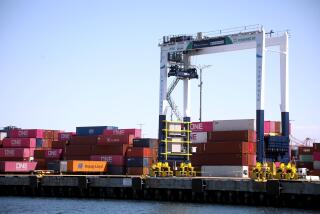Honda Unit Stops Making Battery-Powered Electric Car
- Share via
American Honda Motor Co. has quietly stopped production of its EV Plus, becoming the first major auto maker to acknowledge that it sees no future in marketing costly battery-powered electric cars.
After spending hundreds of millions of dollars to develop storage battery technology, the auto industry is starting to pull the plug. Honda’s decision to drop out of the battery pack is one of the strongest indications yet that this once-promising technology is failing to win over consumers.
Instead of working on battery electrics, Honda wants to join the rest of the industry in focusing its efforts on such technologies as fuel cells--which produce electricity directly and don’t need heavy, expensive batteries that have limited driving range.
Honda’s pullback could touch off a battle with the California Air Resources Board.
“We’re highly disappointed in Honda,” CARB’s chief deputy director, Tom Cackette, said Wednesday. “We are concerned that this violates their agreement with the board to continue to produce battery-electric vehicles if customer demand warrants it.” He added that the board will investigate.
At least one environmental group is also taking issue with Honda’s position. The company “has shown a lack of good faith about environmental laws,” said Roland Hwang, a San Francisco-based analyst with the Union of Concerned Scientists.
But Honda executives “don’t believe we’re in violation,” company spokesman Art Garner said. “The program has met both the letter and the spirit of the agreement. Our commitment was to lease 300 electric vehicles over three years, and we’ve done that.”
Torrance-based American Honda, often lauded for its leadership in producing low-emission vehicles, says the EV Plus has outlived its usefulness as a research platform and that it was unsuccessful in developing public demand. Most leases were to businesses and government agencies required by law to use lower-emission vehicles.
The decision to stop making the EV Plus “sends a lot of signals,” said Thad Malesh, senior analyst and alternate-fuels specialist at J.D. Power & Associates in Agoura Hills. “They are certainly being more honest that anyone else about [battery-dependent] electrics.”
In another blow to the battery-electric movement, Edison International, concerned about the poor public acceptance of the vehicles, confirmed Wednesday that it is closing its Edison EV subsidiary, which has installed 250 charging stations in California and Arizona.
Even Toyota Motor Sales USA, which has committed to continued development of its battery-powered RAV4 electric, says the autos have no real appeal for consumers because of high cost and limited range.
But these developments don’t mean the industry is veering off the “green” highway. Auto makers, in fact, are stepping up efforts to create commercially acceptable zero-emission vehicles in order to meet clean-air mandates in California, New York and several other states.
California air-quality rules require that up to 10% of all new cars sold by the seven leading car companies in this state’s market be classified as zero-emission vehicles, or ZEVs, starting in 2003. A new class of “super-ultra-low-emission” vehicles can be used to offset a big chunk of the zero-emission requirement, but each company must have a minimum of 4% of its new cars meet ZEV standards. That’s at least 54,000 vehicles--more than 7,000 for Honda alone--based on 1998 California car sales.
Yet fewer than 2,400 battery electric cars and trucks have been sold or leased in the U.S. in the last three years, most of them in California. Although the vehicles generally draw praise from users for reliability and comfort, their utility is limited by storage battery technology, the key reason auto makers are now concentrating on fuel cells.
Battery packs add hundreds of pounds to a vehicle’s weight and can cost tens of thousands of dollars to replace (battery life ranges from three to six years). Then there’s the high cost (EV leases average $450 a month) and the short range (few EVs in real-world use can go more than 75 miles between charges).
Most auto makers don’t expect an alternative to batteries to be ready until after the 2003 California deadline, so they have adopted attitudes like that of Toyota. It intends to continue producing the RAV4 electric sport-utility for several more years and plans to lease 1,000 of them. There are 500 in use now.
In addition to Toyota, such major auto makers as General Motors, Ford, DaimlerChrysler and Nissan say they will continue to develop battery-electric vehicles while pursuing other technologies.
With its decision to discontinue the EV Plus, Honda may be signaling that it has an alternative zero-emissions vehicle in the pipeline, industry watchers say.
Honda is enthusiastic about its new VV hybrid gasoline-electric vehicle. The $19,500 two-seater, to go on sale in the U.S. next year, uses an electric motor to boost a small gas engine. It gets 70 miles per gallon of gas and is classified as an ultra-low-emissions car.
*
HIGHWAY 1
Top automotive designers assess the state of their art--and the cars we’ll be driving. W1






